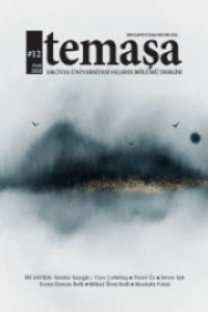Heidegger’in Estetik-Dışı Sanat Anlayışı: Felsefeyi Disiplinlerden Özgürleştiren Bir Düşünme Tarzı
Heidegger’in geç döneminde hem sanat konusuna yönelmiş hem de estetiği felsefi bir disiplin olarak köktenci bir tavırla reddetmiş olması şu soruyu akla getirir: Belirli bir disiplinin sınırları içinde karşımıza çıkan bir konunun felsefesini, o disiplini tamamen yadsıyarak yapmakta bir tutarsızlık yok mudur? Bu makalenin amacı, Heidegger’in sanat üzerine yaptığı felsefenin estetik-dışı olmasında görünüşte ortaya çıkan bu tutarsızlığın, bir tutarsızlık olmak bir yana, onun geleneksel ontolojiye ve dolayısıyla metafiziğe karşı ilk baş yapıtı Varlık ve Zaman’dan beri geliştirdiği temel itirazın kaçınılmaz ve tutarlı bir sonucu olduğunu göstermektir: Estetik disiplini, tam da Heidegger’in söküme uğratmaya (Destruktion) giriştiği ve “varlık unutkanlığı ile itham ettiği metafiziğin belirlenimi altında ortaya çıkan bir düşünme tarzı olduğu için, Heidegger açısından, sanat üzerine yapılan felsefe, bir yandan da estetiğin üstesinden gelinmesini amaçlayan bir felsefe olmalı ve metafiziğin üstesinden gelinmesi yönündeki daha büyük bir projenin bir parçası olarak anlaşılmalıdır. Dolayısıyla, Heidegger’in felsefesi, yalnızca estetiğe karşı değil, felsefesi yapılan konuları kendi tekeline alma iddiası taşıyan tüm disiplinlere karşı onların çizdiği sınırları sorgulamaya ve aşmaya girişen, bütünlüklü, disiplinler-üstü bir düşünme tarzı olarak ele alınmalıdır.
Heidegger’s Non-Aesthetic Conception of Arts: A Way of Thinking That Sets Philosophy Free From Disciplines
The fact that the later Heidegger focuses on the subject of art while radically rejecting aesthetics as a philosophical discipline, gives rise to the following question: Is there no contradiction between doing philosophy on a subject matter encountered within the borders of a discipline while denying completely the legitimacy of the discipline itself? The aim of this paper is to show that the seeming contradiction in Heidegger’s non-aesthetic attitude in his thought on art is not only not a contradiction, but it is an inevitable and consistent consequence of his objection to traditional ontology and metaphysics. Since aesthetics as a discipline is already based on metaphysics accused by Heidegger for its “forgetfulness of Being”, a philosophy on art should be a thinking that aims to overcome aesthetics, and such thinking should be understood as part of the greater project called “overcoming metaphysics”. Consequently, Heidegger’s philosophy should be understood not only as a way of thinking against aesthetics, but also as a way of thinking against all of the philosophical disciplines, which take philosophical subjects over and monopolize them under their headings. His philosophy should be conceived as a holistic and trans-disciplinary way of thinking that questions and tries to overcome the borders imposed upon philosophy by disciplines.
Keywords:
Heidegger, Art, Aesthetics, Metaphysics, Being, Truth,
___
- Aktok, Özgür. “Sunuş”, Heidegger, ed. Özgür Aktok-Metin Bal, Ankara: Doğu Batı Yayınları, 2010.
- Aktok, Özgür. “Platon’un Mağarasına Dönüş Yolunda: Heidegger, Platon ve Aletheia”, Felsefidüşün Akademik Felsefe Dergisi, Nisan, Sayı 8, İstanbul: Pinhan Yayıncılık, (2017): 47-79.
- Hegel, Georg Freidrich. Ästhetics. Lectures on Fine Art, trans. T.M. Knox, 2 vols., Oxford: Clarendon Press, 1975.
- Heidegger, Martin. Aristoteles. Metaphysik 1-3. Vom Wesen und Wirklichkeit der Kraft, GA 33, Frankfurt: Vittorio Klostermann, 1990.
- Heidegger, Martin. Beiträge zur Philosophie (Vom Ereignis) GA 65, Frankfurt: Vittoria Klostermann, 1989.
- Heidegger, Martin. “Der Ursprung des Kunstwerkes” in Holzwege GA 5, ss. 1-74, Frankfurt: Vittoria Klostermann, 1977.
- Heidegger, Martin. Hölderlins Hymne “Der Ister” GA 53, Frankfurt: Vittoria Klostermann, 1984.
- Heidegger, Martin. "Letter on Humanism", in Basic Writings: Nine Key Essays, plus the Introduction to Being and Time, trans. David Farrell Krell, 2nd ed., ss. 213-266, London: Routledge, 1993.
- Heidegger, Martin. Sein und Zeit, 10. Basım, Tübingen: Max Niemeyer Verlag, 1963.
- Heidegger, Martin. Parmenides, GA 54, Frankfurt: Vittorio Klostermann, 1991.
- Kant, Immanuel. Critique of the Power of Judgment (The Cambridge Edition of the Works of Immanuel Kant), ed. Paul Guyer, trans. Paul Guyer and Eric Matthews, Cambridge: Cambridge University Press, 2000.
- Schelling, Friedrich Wilhelm Joseph. Sämmtliche Werke, , I. Abteilung Vols. 1–10, II Abteilung Vols. 1–4, ed. K.F.A. Schelling, Stuttgart: Cotta, 1856-61.
- ISSN: 2148-371X
- Yayın Aralığı: Yılda 2 Sayı
- Başlangıç: 2014
- Yayıncı: Prof. Dr. Arslan Topakkaya / Erciyes Üniversitesi Felsefe Bölümü
Sayıdaki Diğer Makaleler
Heidegger’in Estetik-Dışı Sanat Anlayışı: Felsefeyi Disiplinlerden Özgürleştiren Bir Düşünme Tarzı
KSENOPHANES: TANRI ve DOĞA ÜZERİNE
Leibniz’in Klasik ve Modern Mantığa Katkıları
İhvân-ı Safâ’da Matematik Felsefesinin İmkânı ve Boyutları1
Wilhelm Dilthey Felsefesinde “Anlama” Kavramı ve Dolayımları
Max Weber: Karl Jaspers’in Perspektifinden Bir Profil
Ne – Varlık ve Hiçlik: Trans-Ontolojik Bir Düşünüm
Endülüs’te Felsefenin Meşrulaştırılması: İbn Tufeyl ve İbn Rüşd
